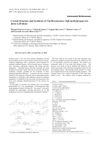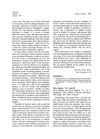 15 citations,
January 2002 in “Gynecological endocrinology”
15 citations,
January 2002 in “Gynecological endocrinology” Hormones affect skin aging and fat distribution, and treatments can help, but only minoxidil is proven for female hair loss.
 July 2023 in “CRC Press eBooks”
July 2023 in “CRC Press eBooks” PCOS is a hormonal disorder in women with no cure, managed by medication and lifestyle changes.
 26 citations,
December 2016 in “Psychiatric Clinics of North America”
26 citations,
December 2016 in “Psychiatric Clinics of North America” Testosterone therapy and surgeries like mastectomy improve transgender men's lives and mental health with low risks and high satisfaction.
 2 citations,
October 2001 in “Analytical Sciences”
2 citations,
October 2001 in “Analytical Sciences” A new compound that could treat various androgen-related conditions was created and analyzed.
 5 citations,
January 2014 in “BioMed Research International”
5 citations,
January 2014 in “BioMed Research International” Hormonal status significantly affects women's skin health throughout their lives.
 71 citations,
August 2019 in “The journal of sexual medicine”
71 citations,
August 2019 in “The journal of sexual medicine” Testosterone treatment effectively causes male physical development in transgender male adolescents but may lead to side effects like acne, higher BMI and blood pressure, lower good cholesterol, and decreased bone density.
 February 2024 in “Curēus”
February 2024 in “Curēus” A balanced diet with proteins, vitamins, and minerals is crucial for managing skin disorders.
 February 2025 in “Pharmaceuticals”
February 2025 in “Pharmaceuticals” Myo-inositol with magnesium effectively reduces acne and hirsutism in PCOS patients without side effects.
 August 2023 in “The journal of investigative dermatology/Journal of investigative dermatology”
August 2023 in “The journal of investigative dermatology/Journal of investigative dermatology” People with certain skin disorders are more likely to have alcohol problems, especially if they also have mental health issues like depression and anxiety.
 1 citations,
November 2015 in “European medical journal”
1 citations,
November 2015 in “European medical journal” Acne is common and can be linked to various systemic health conditions and syndromes.
 14 citations,
October 2016 in “Physiological Research”
14 citations,
October 2016 in “Physiological Research” Alfacalcidiol and metformin together lowered testosterone in women with PCOS, but did not significantly improve acne, hair growth, or pregnancy rates.
 1 citations,
January 1989 in “Journal of dermatological treatment”
1 citations,
January 1989 in “Journal of dermatological treatment” Azelaic acid may help treat acne by killing bacteria, reducing inflammation, and preventing clogged pores.
July 2001 in “Pediatrics in review” The girl's increased hair growth and other symptoms were due to a hormone-secreting ovarian tumor, which was successfully treated with surgery.
 19 citations,
February 2018 in “Nutrients”
19 citations,
February 2018 in “Nutrients” Certain zinc transporters are essential for healthy skin and managing zinc in the body could help treat skin problems.
 August 2024 in “Archives of Dermatological Research”
August 2024 in “Archives of Dermatological Research” Acne severity is not related to the type or severity of androgenetic alopecia.
 222 citations,
January 2014 in “International journal of reproductive medicine”
222 citations,
January 2014 in “International journal of reproductive medicine” Insulin resistance and obesity are key factors in the development and worsening of polycystic ovary syndrome, and lifestyle changes are important for managing it.
4 citations,
July 1983 in “Journal of steroid biochemistry/Journal of Steroid Biochemistry” Certain hormones can reduce skin oil and hair growth, potentially helping treat acne and excessive hair in women.
 2 citations,
September 2021
2 citations,
September 2021 The COVID-19 pandemic increased the use of teledermatology to treat skin conditions in low-income areas, despite challenges like poor photo quality.
 January 1983 in “Journal of The American Academy of Dermatology”
January 1983 in “Journal of The American Academy of Dermatology” The document suggests improvements for a hair and scalp disease book and recommends a two-volume skin surgery reference for dermatologists.
 1 citations,
July 2019 in “The journal of applied laboratory medicine”
1 citations,
July 2019 in “The journal of applied laboratory medicine” Venous catheterization may help diagnose the cause of female hyperandrogenism when imaging is unclear.
 10 citations,
January 2014 in “Endocrinology & metabolic syndrome”
10 citations,
January 2014 in “Endocrinology & metabolic syndrome” PCOS is a long-term condition that needs more research for better understanding and treatment.
 April 2023 in “JAAD international”
April 2023 in “JAAD international” Patients with Frontal fibrosing alopecia in Morocco often have skin conditions and thyroid disorders.
 2 citations,
September 2014 in “Journal of evolution of medical and dental sciences”
2 citations,
September 2014 in “Journal of evolution of medical and dental sciences” Evaluating various physical and health factors helps diagnose polycystic ovarian syndrome (PCOS).
 September 2016 in “Gynecology Obstetrics and Reproductive Medicine”
September 2016 in “Gynecology Obstetrics and Reproductive Medicine” Effective treatment for skin issues in women with PCOS includes oral contraceptives, antiandrogens, and other medications and procedures.
 November 2021 in “Journal of The American Academy of Dermatology”
November 2021 in “Journal of The American Academy of Dermatology” Different stages and types of female hair loss are linked with age, menopause, high blood pressure, and skin conditions like acne and hirsutism.
 31 citations,
October 2015 in “DOAJ (DOAJ: Directory of Open Access Journals)”
31 citations,
October 2015 in “DOAJ (DOAJ: Directory of Open Access Journals)” Polycystic Ovary Syndrome (PCOS) is not very common among Iranian women, but it's important to prevent it because of the risk of heart disease and infertility.
 4 citations,
December 2021 in “Journal of The American Academy of Dermatology”
4 citations,
December 2021 in “Journal of The American Academy of Dermatology” Doctors are prescribing spironolactone more often to treat acne and skin conditions in teenagers, and it seems safe and well-tolerated.
 2 citations,
April 2021 in “Cureus”
2 citations,
April 2021 in “Cureus” Two new reliable Arabic questionnaires for measuring quality of life in women with PCOS were created, one for married and one for unmarried women.
3 citations,
May 2007 in “Clinical and Experimental Dermatology” Hair does not prevent acne.
January 2022 in “Advanced Pharmaceutical Bulletin” Clove oil and grape seed extract increase finasteride skin absorption, while urea decreases it.


























